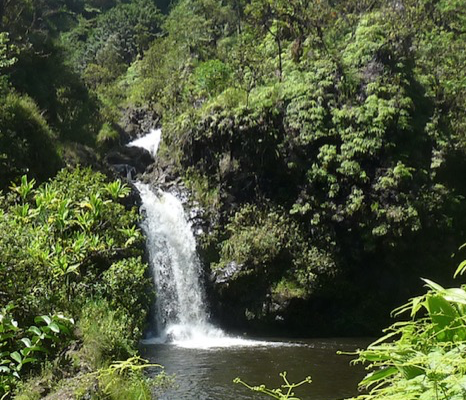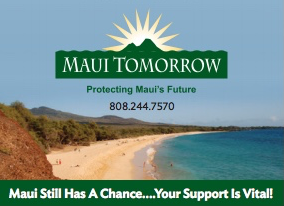(Because the situation’s DIRE)
The DIRE Coalition is a group of Maui organizations, residents and visitors committed to protecting our precious coral reefs and ocean and to wise use of scarce water resources. The DIRE Coalition advocates reclaiming and using our treated wastewater for irrigation, stream restoration, green belts and fire prevention, rather than injecting it into wells were it migrates to the ocean, promotes algae growth, and suffocates our reefs.
Water Recycling Can Reduce and Prevent Pollution – “When pollutant discharges to oceans, rivers, and other water bodies are curtailed, the pollutant loadings to these bodies are decreased. Moreover, in some cases, substances that can be pollutants when discharged to a body of water can be beneficially reused for irrigation. For example, recycled water may contain higher levels of nutrients, such as nitrogen, than potable water. Application of recycled water for agricultural and landscape irrigation can provide an additional source of nutrients and lessen the need to apply synthetic fertilizers.” – EPA Region 9, “Water Recycling and Reuse: The Environmental Benefit.”
We, the members of the DIRE Coalition, are not just AGAINST injection wells that discard valuable wastewater reources and harm our reefs and pollute our ocean. We are FOR effective wastewater treatment to protect public health and the environment. And we are FOR safe and appropriate reclamation, re-direction, and beneficial re-use of effectively treated wastewater resources on land. If the treatment is sufficient, wastwater effluent can be safely and beneficially re-used on land. If the treatment is not sufficent, we should not be putting these wastewaters down wells and into the oceans where we swim, dive, snorkle, fish, work, and invite island visitors to play.
Instead of discarding valuable wastewater resources down injection wells, Maui County should clean and sanitize wastewater effluent to meet and exceed R-1 standards and re-use it, where appropriate, for uses such as agricultural and landscape irrigation, fire prevention/ greenbelts, and/or golf course watering. It is important to ensure levels of treatment that protects the public’s health and safety and the environment from superbugs like MRSA, pharmaceuticals (that may be excreted or flushed), and antibiotic resistant genes (ARGs) that can remain intact and become part of the environment. (This higher level of treatment is needed regardless of whether we continue disposing of the wastewater in wells that flow into the ocean or whether we more wisely use the wastewaters as a resource on land.)
Effective treatment coupled with appropriate wastewater re-use would reduce the amount of wastewater dumped underground in injection wells at the Honokawai (Lahaina) facility — estimated at 3-4 million gallons per day (1.1-1.45 billon gallons a year), help prevent harmful algae blooms that threaten our reefs, decrease the use of potable water for irrigation in West Maui, free up water for stream flow restoration, and better protect the public’s health and the environment.
County injection wells are also used to discard daily millions of gallons valuable wastewater resources at the Kihei and Kahului waste treatment plants. These wastewater wells too contribute to the pollution of our ocean. It’s not just a concern in Lahaina.
Wastewater Injection Wells
- Threaten our reefs
- Waste precious water
- Increase waterborne infections
- Harm our economy
- Pollute Maui’s incredible environment
Our Environment is Our Economy and Our Home
Join us! – Take Action ReDIRECT ~ ReUSE to:
- Save our reefs!
- Control and fight fires!
- Keep Maui green!
- Irrigate and fertilize the land!
- Create new jobs!
- Reduce waterborne disease!
Injection wells permit exemption upheld
The Maui Planning Commission voted 5-1 to uphold Planning Director Jeff Hunt’s determination that the Division of Wastewater Management is exempt from having to obtain a special management area permit to build two replacement injection wells at the Kahului wastewater treatment plant. The sole dissenting vote came from Commissioner Warren Shibuya, and the five votes in favor were cast by Commissioners Kent Hiranaga, Jack Freitas, Orlando Tagorda, Ward Mardfin and Lori Sablas. Commission Chairman Jonathan Starr did not cast a vote.
Councilors consider restrictions on injection wells
County Council members on April 28 heard proposals that would require the Environmental Management Dept. to recycle more wastewater and sample more water for contamination before rehabilitating existing injection wells.


